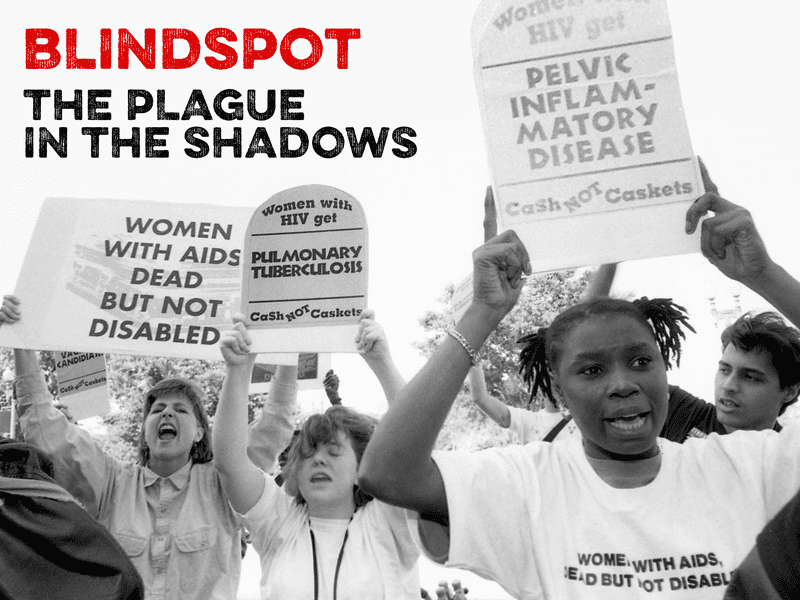Kai Wright: Hey, it's Kai, and I want to tell you about a special project I've been working on for many months. Some of you may know that for a lot of my career, my journalism, as a reporter and as an editor was focused on covering the AIDS epidemic. A public health crisis that was and still is having an outsized impact on my own communities both as a gay man and as a Black gay man. In that work, I was blessed to meet so many remarkable people all over the world who stood up in the fight against AIDS.
I carried their stories with me over the past year or so as I joined my colleague Lizzy Ratner in revisiting the early history of AIDS in America. We've made a series called The Plague In The Shadows. It's the latest season of the podcast Blindspot from WNYC and the History Channel and hosted by yours truly. In it, we look back at the onset of the epidemic and think about what could have been different if more people had listened to those who rang the alarm. We meet a lot of the brave people who did, in fact, step up. Here's a preview of what you'll find in the series.
In the late 1970s and '80s, New York City could be a dangerous place.
Speaker 2: People just started disappearing. One day they were there and the next day they were gone. Where did they go?
Speaker 3: New York is plagued by violence, drugs, and poverty.
Kai Wright: These problems were manufactured by neglect.
Speaker 4: It's not just that it was negligent, it was willful negligence.
Kai Wright: They gave cover to a new and deadly virus, HIV.
Speaker 2: We said that people had the monster because they had that look, they had the sucked-in cheeks, they were really thin.
Kai Wright: Misinformation and disinformation about HIV and AIDS was common.
Speaker 5: They said it was only gay men that could get it. I said well I'm not a gay man so how would I get it? I'm an African-American woman, so I wouldn't have it. How did my baby die?
Kai Wright: I'm Kai Wright, host of Blindspot, The Plague In The Shadows. In this series, we will meet people who saw what was happening around them in their neighborhoods, in their communities, and decided they needed to do something even though many of them were just straight out afraid.
Speaker 6: Go back to the early '80s, and mid-'80s, AIDS hits New York City like a pandemic. People are scared. They don't know how it transmits, or how you can get it. Everybody says it's body fluids, and it's this and it's that, and people didn't know.
Kai Wright: Despite this fear and stigma, people stepped up. People like doctors on the pediatric ward at Harlem Hospital.
Speaker 7: They would come into the hospital, be admitted to my ICU, and die.
Lizzy Ratner: Roughly how many kids would you say there were from year to year?
Speaker 9: It started as one, then it was two, then it was four, then it was this progression. I would say that by the end of the first year, we had dozens, and before long we had a couple of hundred.
Speaker 10: What are you going to do with this? When you get all done and reach heaven, and Peter says, "What did you do with AIDS? What is it you're going to do with it? What do you hope will happen?" I want to make sure you're not exploiting.
Kai Wright: Our understanding of the history of HIV and AIDS and who has been affected by it is incomplete. We have overlooked or forgotten too many of the stories and lessons that the people who first confronted this epidemic tried to teach us.
Speaker 11: We literally had to convince the federal government that there were women getting HIV.
[crowd chanting]
Speaker 12: I represent the excluded and underrepresented groups of women, minorities, and HIV-positive individuals and also prisoners, of which I am a member of all of the above.
Speaker 13: It was hard fought, lives were lost, and it was activists. We changed the world.
[music]
Kai Wright: Blind Spot, The Plague In The Shadows, stories from the early days of AIDS and the people who refuse to stay out of sight. A podcast from the History Channel and WNYC Studios, available January 18th.
[music]
Episodes of Blindspot, The Plague in The Shadows are available now wherever you find podcasts. New episodes drop every Thursday, and we're going to be sharing some of them here over the next few week too. Hope you listen and enjoy.
Copyright © 2024 New York Public Radio. All rights reserved. Visit our website terms of use at www.wnyc.org for further information.
New York Public Radio transcripts are created on a rush deadline, often by contractors. This text may not be in its final form and may be updated or revised in the future. Accuracy and availability may vary. The authoritative record of New York Public Radio’s programming is the audio record.

